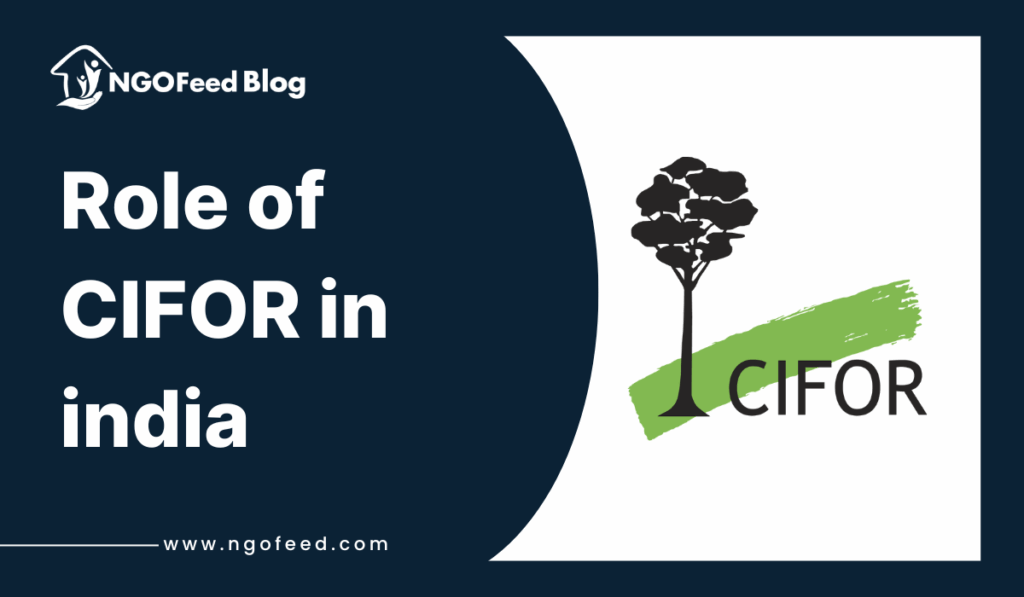Role of CIFOR in India: The Centre for International Forestry Research (CIFOR) is a well-known research centre that works on enhancing sustainable forest management, biodiversity conservation, and adaptation to climate change on the global level. Although CIFOR is a global organisation, its activities in India have gained significance in recent years as the country continues to struggle with environmental problems, deforestation, and climate issues.
CIFOR collaborates with government agencies, research institutions, and local non-governmental organisations to develop evidence-based forest policies and practices in India, promoting sustainable land use. The organisation makes some valuable research contributions in areas of interest, such as agroforestry, forest landscape restoration, and community-based management of their natural sources of life. CIFOR also augments the benefits of the rural population through its connection to the Indian stakeholders to advance all aspects of gender equity in forest governance, and support the creation of resilience to climate conditions in areas that are at risk of such changes.
Also Read: Role of UNESCAP in India
CIFOR, together with India, has its initiatives that are geared towards fulfilling the UN Sustainable Development Goals (SDGs), especially the aspects of climate action, life on land, and sustainable cities. Its science-based model allows filling the gap between international environmental agendas and domestic execution.
CIFOR has been able to impact the sustainable practices of forestry all over India by facilitating policy making and community participation, and there is no doubt that it can support a community to establish a balance that can help people as well as nature to prosper.
Table of Contents
What is CIFOR and Its Global Mission?
The Center for International Forestry Research (CIFOR) is a globally recognized research organization focusing on sustainable forest management and climate-resilient development. Founded in 1993 and headquartered in Indonesia, CIFOR strives to produce evidence-based knowledge and insights to influence policy, improve the governance of forests and empower communities in decision making across Asia, Africa, and Latin America.
CIFOR operates based on four global missions:
- To promote sustainable forestry
- To mitigate climate change impacts by sustaining forests
- To improve livelihoods by managing resources equitably
- To influence national and international policies related to biodiversity and land use.
CIFOR integrates scientific knowledge from a range of disciplines with action-oriented research. CIFOR works to complement the United Nations Sustainable Development Goals (SDGs), the Paris Agreement, the UN Decade on Ecosystem Restoration, and others by linking together policy, research, and action needs at global and local levels. Ultimately, CIFOR wants to achieve a better, more sustainable, equitable and climate-resilient future for all people and the planet.
Also Read: Role of UNWTO in Tourism
CIFOR’s Key Initiatives in India
In India The Center for International Forestry Research (CIFOR) had been intensively engaged in supporting sustainability of forest landscapes, biodiversity conservation, resource inclusive and governance. Although CIFOR does not have its own office in India, it is cooperating with national organizations, non-governmental organizations and government departments to encourage evidence-based policies and community-based forest management.
CIFOR has some important initiatives in India such as:
- Forest and Livelihood Research: Together with Indian researchers, CIFOR has been researching the way forest-dependent communities control natural resources and the policy can contribute to conservation, as well as, to the necessary livelihood security.
- Climate Change and REDD+: CIFOR has participated in conversations on REDD+ (Reducing Emissions from Deforestation and Forest Degradation) implementation on India, providing scientific expertise on procedures of monitoring carbon stock and its benefit-sharing options.
Also Read: Role of UNHRC in India
- Landscape Restoration: CIFOR assists India in its pledges to forest landscape restoration through international mechanisms such as the Bonn Challenge with the capacity to offer research and advisory services on ecosystems restoration options.
- Gender and Equity in Forestry: Depending on the local NGOs, CIFOR would promote the presence of women and the marginalized groups in making forest decision and natural resource management.
Such projects allude to the part CIFOR plays in harmonizing the nationwide forestry approaches of India to the world sustainability movements as well as the locally based growth requirements.
Impact on Local Communities and Ecosystems
The activities of CIFOR in India (in the spheres of research as well as promotion of sustainable forest governance) have been and continue to be significant in terms of their contribution to the life of both local communities and of the ecosystems. On a people-focused forestry and evidence-based practices, CIFOR aids work that ensures a balance between ecological wellbeing and socio-economic growth.
Also Read: Role of WFP in India
Areas of Impact:
Better Lives: The research conducted by CIFOR shall also help in the improvement of income generating activities on the forest dependent people through their conventional sustainable harvesting, agroforestry and establishment of forest based enterprises.
Enhancement of Marginalized Groups: CIFOR supports the approach to inclusive decision-making and gender equity so that females and indigenous people could better express their opinions on forests management and the distribution of benefits.
Biodiversity conservation: CIFOR science based knowledge is used to work towards conservation of indigenous species and forest ecosystems through its support of landscape level management and planning of conservation.
Climate Change Resilience: Communities that are empowered by the projects aligned to CIFOR are also more able to respond to the climate risks since they are aware of the sustainable land use practices and the processes of restoration.
Also Read: Role of UNAIDS in India
Knowledge Sharing: CIFOR has helped to transfer the findings of global research to the local settings which increased the strength of Indian institutions and NGOs to face environmental issues.
In sum, the projects of CIFOR contribute to the establishment of a more sustainable interaction between the communities and forests, guaranteeing sustainable ecological service and welfare to people in the long-term perspective.
Partnerships with Indian NGOs and Institutions
CIFOR ( Center for International Forestry Research ) knows that local partnerships are crucial in establishment of meaningful and sustainable impact. CIFOR is engaged in India working with various NGOs, universities and government agencies to transfer international forest research into local, community-based actions.
Important points of these Partnerships:
Research Collaboration: CIFOR collaborates with Indian research partners, including the Indian Council of Forestry Research and Education (ICFRE) and several universities, on co-creating research on topics to include forest governance, biodiversity, and climate resilience.
Capacity Building: Through collaborating with the grassroots NGOs, CIFOR helps with training programs, reinforcing local skills in sustainable forest selection and restoration of ecosystems, as well as community rights.
Also Read: Role of UNODC in India
Policy Advocacy: CIFOR has been working along with policy think tanks and environmental non-government organizations in creating more inclusive and sustainable forest policy in India.
Community Engagement: Indian NGOs play a very important role in facilitating research results by connecting the research conducted by CIFOR to the people and the forest
dependent communities to come up with forest management measures that are culture friendly and effective on the ground.
Knowledge Exchange: Such collaborations enable each other to learn and through such collaboration global best practice can be translated into Indian conditions and vice versa local innovations can be scaled up to the international community.
Also Read: Role of UNEP in the Environment
It is through such collaborations that CIFOR is keen on making sure that its mission of equitable science-based forest management is anchored in the truth of the Indian landscapes and people.
Frequently Asked Questions (FAQs)
Q.1 What is the role of CIFOR in India?
The Center for International Forestry Research supports sustainable forest management and climate change adaptation in India. CIFOR works through research, policy influence, and community engagement. Collaborating with NGOs, government departments, and local institutions in India, CIFOR promotes biodiversity, ecosystem restoration, and rural livelihoods. Indeed, CIFOR’s work contributes to India’s environmental objectives and global climate change commitments.
2. How does CIFOR work with communities in India?
CIFOR works with local NGOs undertake engagement with forest-dependent communities to provide knowledge, tools, and training to manage forests sustainably and improve their livelihoods.
3. What are CIFOR’s projects in India?
CIFOR implements projects in India that range from community forestry, and social forestry, to biodiversity conservation, landscape restoration, and climate resilience, particularly in ecologically sensitive areas.
4. Why are partnerships a key element for CIFOR’s work in India?
In India, characteristically, networks of various organizations exist. CIFOR focusses on building partnerships with Indian NGOs, academic institutions and, government agencies to tailor global forest challenges to local action and relevance. This supports impactful action from local communities.
5. How can NGOs or researchers in India work with CIFOR?
Organisations interested in working together with CIFOR can connect through CIFOR’s official webpage; and be involved in regional workshops, as well joint research, training and advocacy projects.




